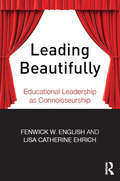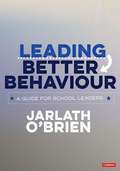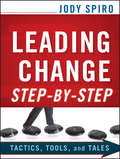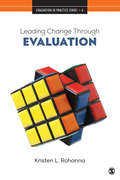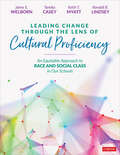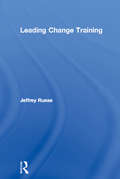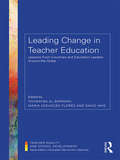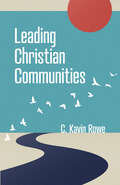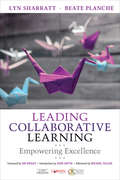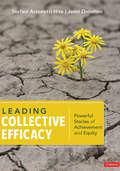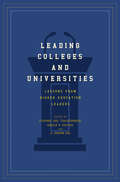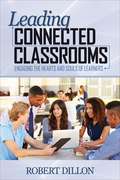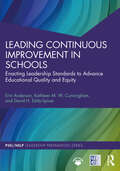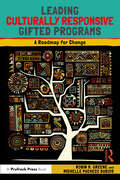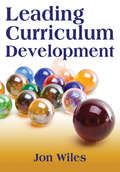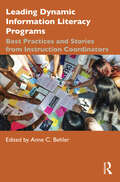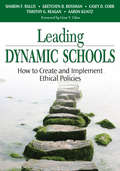- Table View
- List View
Leading Beautifully: Educational Leadership as Connoisseurship
by Fenwick W. English Lisa Catherine EhrichLeading Beautifully provides a new dimension to understanding effective leadership. Drawing from lessons in the arts and the humanities, English and Ehrich explore how educational decision-making in schools can be informed by identity, personal competence, and an understanding of the field’s intellectual foundations. Based on in-depth interviews of artists and educational leaders, this book provides insight into the inner world of successful leaders who have developed competencies and understandings that extend beyond the standard leadership tool box. This exciting new book explores the theory and practice of leadership connoisseurship as a human-centered endeavor and as an antidote to mechanistic, business-oriented practices. The authors’ well-grounded reconsideration of educational leadership will enliven and enhance any educational leader’s practice.
Leading Better Behaviour: A Guide for School Leaders (Corwin Ltd)
by Jarlath O'BrienHow can an informed, evidence-based whole school approach to behaviour benefit you, your colleagues and your students? In this companion to Better Behaviour, Jarlath O&’Brien combines insights from his own experience of improving behaviour in schools, research and policy in a practical guide to support current and aspiring school leaders. Through discussing the everyday issues that come with leading on behaviour, and casting a critical eye over sanctions, rewards and exclusions, this book encourages you to develop an approach that is firmly rooted in the values of your school, supports staff and will help navigate the challenges that can arise.
Leading Better Behaviour: A Guide for School Leaders (Corwin Ltd)
by Jarlath O'BrienHow can an informed, evidence-based whole school approach to behaviour benefit you, your colleagues and your students? In this companion to Better Behaviour, Jarlath O&’Brien combines insights from his own experience of improving behaviour in schools, research and policy in a practical guide to support current and aspiring school leaders. Through discussing the everyday issues that come with leading on behaviour, and casting a critical eye over sanctions, rewards and exclusions, this book encourages you to develop an approach that is firmly rooted in the values of your school, supports staff and will help navigate the challenges that can arise.
Leading Change Step-by-Step
by Jody SpiroA practical, step-by-step guide to leading change efforts for sustainable resultsLeading Change Step-by-Step offers a comprehensive and tactical guide for change leaders. Spiro's approach has been field-tested for more than a decade and proven effective in a wide variety of public sector organizations including K-12 schools, universities, international agencies and non-profits. The book is filled with proven tactics for implementing change successfully, with helpful tools to put change efforts into practice (including forms, rubrics, and helpful questions to ask). Also included are success stories that show how this approach has been used effectively in 22 states and internationally. The tools reveal how the leader analyzes situations, identifies the groups needed to get desired results, and works with them effectively to do so.Includes engaging self-analyses for leaders to inform their leadership when putting in place a change initiativeJody Spiro is an experienced leader of systems change for public, nonprofit, and private sector organizationsOffers information on assessing a situation, engaging stakeholders, planning "early wins," minimizing resistance, building a supportive culture and much moreThis important resource shows how to translate a vision of a sustainable educational reform into a series of coordinated action steps.
Leading Change Through Evaluation: Improvement Science in Action (Evaluation in Practice Series)
by Kristen L. RohannaEvaluators who are interested in developing or improving a program or policy frequently look to formative evaluation as a guiding framework.This book shows why those hoping to use evaluation to drive change in complex systems, rather than develop or improve one program, policy, or product, need to shift from the oversimplified idea of formative evaluation to a more specified continuous improvement model grounded in improvement science. In doing so, author Kristen L. Rohanna provides guidance to both evaluators and others, such as K-12 educators or hospital administrators, who lead improvement initiatives in their organizations and seek to solve persistent problems of practice. The book includes an extended case study: a networked improvement community of five public middle and high schools.
Leading Change Through Evaluation: Improvement Science in Action (Evaluation in Practice Series)
by Kristen L. RohannaEvaluators who are interested in developing or improving a program or policy frequently look to formative evaluation as a guiding framework.This book shows why those hoping to use evaluation to drive change in complex systems, rather than develop or improve one program, policy, or product, need to shift from the oversimplified idea of formative evaluation to a more specified continuous improvement model grounded in improvement science. In doing so, author Kristen L. Rohanna provides guidance to both evaluators and others, such as K-12 educators or hospital administrators, who lead improvement initiatives in their organizations and seek to solve persistent problems of practice. The book includes an extended case study: a networked improvement community of five public middle and high schools.
Leading Change Through the Lens of Cultural Proficiency: An Equitable Approach to Race and Social Class in Our Schools
by Randall B. Lindsey Keith T. Myatt Jaime E. Welborn Tamika CaseyThe pathway to uncovering and dismantling inequities Educational leaders who work in the district, site, or classroom level know that opportunity gaps have long been a focus of education policy in the United States. Leadership can be a critical lever for advancing policies that oppose racism and confront systemic inequities. In meeting this challenge, educators have found that acknowledging beliefs and behaviors is critical. Still, deficit-based thinking, especially due to privilege, remains a barrier to equity. Among the most damaging blind spots is the continuation of practices that are grounded in the values of entitled groups. Leading Change Through the Lens of Cultural Proficiency tells the story of a school community in the midwest United States that contended with its approach to teaching and valuing students of diverse backgrounds. Featuring the research-based Cultural Proficiency Framework and Tools, the book provides a clear road map to advancing equity across schools and districts. Designed to support leaders and school communities in developing policies and practices that respond to the needs of all students, this book Guides school leaders in a journey of learning the theory and strategies that improved student achievement and improved the working conditions in this district Features a real-life case study of a school community using the Tools of Cultural Proficiency and the Framework Provides vignettes and data, based on work conducted across an actual school district, that resulted in improvements in school climate, achievement, mindset, and equitable educational practices Includes powerful reflection, dialogic, and action activities for use in a variety of community learning modalities Is grounded in assets-based assumptions with respect to students, families, and the school community With a focus on engagement, leadership, implementation frameworks, and collaborative learning, the authors demonstrate how to uncover and remedy inequities. Designed for education leaders at all levels of the education system, this is the ideal foundational text for implementing Cultural Proficiency in your setting as you open doors for all students to thrive.
Leading Change Through the Lens of Cultural Proficiency: An Equitable Approach to Race and Social Class in Our Schools
by Randall B. Lindsey Keith T. Myatt Jaime E. Welborn Tamika CaseyThe pathway to uncovering and dismantling inequities Educational leaders who work in the district, site, or classroom level know that opportunity gaps have long been a focus of education policy in the United States. Leadership can be a critical lever for advancing policies that oppose racism and confront systemic inequities. In meeting this challenge, educators have found that acknowledging beliefs and behaviors is critical. Still, deficit-based thinking, especially due to privilege, remains a barrier to equity. Among the most damaging blind spots is the continuation of practices that are grounded in the values of entitled groups. Leading Change Through the Lens of Cultural Proficiency tells the story of a school community in the midwest United States that contended with its approach to teaching and valuing students of diverse backgrounds. Featuring the research-based Cultural Proficiency Framework and Tools, the book provides a clear road map to advancing equity across schools and districts. Designed to support leaders and school communities in developing policies and practices that respond to the needs of all students, this book Guides school leaders in a journey of learning the theory and strategies that improved student achievement and improved the working conditions in this district Features a real-life case study of a school community using the Tools of Cultural Proficiency and the Framework Provides vignettes and data, based on work conducted across an actual school district, that resulted in improvements in school climate, achievement, mindset, and equitable educational practices Includes powerful reflection, dialogic, and action activities for use in a variety of community learning modalities Is grounded in assets-based assumptions with respect to students, families, and the school community With a focus on engagement, leadership, implementation frameworks, and collaborative learning, the authors demonstrate how to uncover and remedy inequities. Designed for education leaders at all levels of the education system, this is the ideal foundational text for implementing Cultural Proficiency in your setting as you open doors for all students to thrive.
Leading Change Training
by Jeffrey RussellThe Trainer’s Workshop Series is designed to be a practical, hands-on roadmap to help you quickly develop training in key business areas. Each book in the series offers all the exercises, handouts, assessments, structured experiences and ready-to-use presentations needed to develop effective training sessions. In addition to easy-to-use icons, each book in the series includes a companion CD-ROM with PowerPoint™ presentations and electronic copies of all supporting material featured in the book.Leading Change Training helps you create solid change programmes within your organization and integrate leading-edge change leadership models and other theories into your programme. It not only involves simply reducing resistance, but also creating an awareness of the challenges and responsibilities that each person, irrespective of level, faces as a change initiative goes forward. Contains exercises, handouts, assessments and tools to help you:• create effective change training for executives, leaders, managers and staff• build support and reduce resistance to organisational change• become a more effective and efficient facilitator• ensure training is on target and gets results“This book offers not only the ‘how’ of a programme on leading change, but also an insightful and helpful look at the why, when and where.”Lin Standke, Instructional Design Manager, Centre for Professional Development, CUNA & AffiliatesOther books in this series: Leadership Training, Customer Service Training, New Employee Orientation Training, Leading Change Training.
Leading Change in Teacher Education: Lessons from Countries and Education Leaders around the Globe (Teacher Quality and School Development)
by Thuwayba Al Barwani Maria Assunção Flores David ImigThe international attempt to expand schooling despite dealing with an insufficient number of trained teachers has placed significant pressure on teacher education. Continued effort to change all aspects of teacher education, including ways of learning, methods of practice, institution interaction and assessment of teaching ability, in order to fulfil the desire to offer inclusive and equitable teaching for all, is a serious consideration. In response to this increased attention on cross-national campaigns, Leading Change in Teacher Education features discussions covering what has been done, how and why the change has happened, the journey itself and the challenges encountered along the way, alongside contributions from international academics who share their reflections and suggestions for a way forward, despite a global shortage of teachers. Strategies surrounding the design and delivery of education now centre on improving how teachers are prepared, supported and evaluated. Leading Change in Teacher Education captures the stories of international change leaders by: Providing details of both the successes and challenges faced Presenting innovative practices in teacher education from around the world Describing the strategies put in place to ensure that teacher education is developing The topics discussed are relevant for educators, policymakers and international organizations involved in the design and implementation of programmes in teacher education. Leading Change in Teacher Education is also an invaluable resource for those looking to increase the changes occurring within teacher education.
Leading Christian Communities
by C. Kavin RoweHow to cultivate a thriving Christian community in a disconnected cultureWhat does it mean to be a Christian community? And what does it mean to lead one? How does a pastor address today&’s challenges, from lack of faith in institutions, to conflict in the church, to the tension between tradition and innovation?C. Kavin Rowe addresses these topics and a multitude of others in this collection of keen essays. Bite-size and conversational, yet deeply rooted in Scripture and recent pastoral theology, the essays in Leading Christian Communities reflect on the shaping of Christian leaders for the flourishing of their communities. Pastors and seminarians, as well as all those involved in church ministry, will find inspiration and insight in these pages.
Leading Collaborative Learning: Empowering Excellence
by Lyn D. Sharratt Dr Beate M. PlancheLeadership, collaborative learning, and student achievement – discover what works! This resource-rich book provides a straightforward, strategic path to achieving sustainable communities of collaborative learners. Research-proven inquiry techniques, vignettes, case studies and action-oriented protocols help you build strong learning relationships for high-impact student achievement. System leaders, principals and teachers learn to: Integrate diverse views and perspectives Build trust and hear every voice Leverage key resources and processes Build students’ cognitive, interpersonal, and intrapersonal skills Use “Assessments-in-Action” to improve, monitor and sustain progress Build a collaborative culture through learning together Use this go-to guide to transform your school from a place of ‘good intentions’ to a center of intentional practice today!
Leading Collaborative Learning: Empowering Excellence
by Lyn D. Sharratt Dr Beate M. PlancheLeadership, collaborative learning, and student achievement – discover what works! This resource-rich book provides a straightforward, strategic path to achieving sustainable communities of collaborative learners. Research-proven inquiry techniques, vignettes, case studies and action-oriented protocols help you build strong learning relationships for high-impact student achievement. System leaders, principals and teachers learn to: Integrate diverse views and perspectives Build trust and hear every voice Leverage key resources and processes Build students’ cognitive, interpersonal, and intrapersonal skills Use “Assessments-in-Action” to improve, monitor and sustain progress Build a collaborative culture through learning together Use this go-to guide to transform your school from a place of ‘good intentions’ to a center of intentional practice today!
Leading Collective Efficacy: Powerful Stories of Achievement and Equity
by Jenni Anne Donohoo Stefani Arzonetti HiteInspiration and Guidance to Develop Collective Teacher Efficacy Collective efficacy, or a shared belief that through collective action educators can positively influence student outcomes, has remained at the top of a list of influences on student achievement in John Hattie’s Visible Learning research. Collective efficacy has been embodied by many educators, though collaboration tends to be focused on building community and relationships, which alone are not enough to move the needle on student achievement. This book contains stories of collective efficacy in schools where it has been actualized in practice, and includes: • Real-world case studies of teams who have fostered and sustained collective efficacy • Practical guidance for building collective efficacy through professional learning designs • Tools that can be adapted for specific needs or local contexts Through these accounts, readers will gain a better understanding of ways to capitalize on the reciprocal relationship between student achievement and collective efficacy by having a clear understanding of what collective efficacy looks like and how it can be accomplished.
Leading Collective Efficacy: Powerful Stories of Achievement and Equity
by Jenni Anne Donohoo Stefani Arzonetti HiteInspiration and Guidance to Develop Collective Teacher Efficacy Collective efficacy, or a shared belief that through collective action educators can positively influence student outcomes, has remained at the top of a list of influences on student achievement in John Hattie’s Visible Learning research. Collective efficacy has been embodied by many educators, though collaboration tends to be focused on building community and relationships, which alone are not enough to move the needle on student achievement. This book contains stories of collective efficacy in schools where it has been actualized in practice, and includes: • Real-world case studies of teams who have fostered and sustained collective efficacy • Practical guidance for building collective efficacy through professional learning designs • Tools that can be adapted for specific needs or local contexts Through these accounts, readers will gain a better understanding of ways to capitalize on the reciprocal relationship between student achievement and collective efficacy by having a clear understanding of what collective efficacy looks like and how it can be accomplished.
Leading Colleges and Universities: Lessons from Higher Education Leaders
by Edited by Stephen Joel Trachtenberg, Gerald B. Kauvar, and E. Gordon GeeHow experienced college and university leaders guide successful institutions—and why they sometimes lose their way.Today's college and university leaders face complex problems that test their political acumen as well as their judgment, intellect, empathy, and ability to plan and improvise. How do they thoughtfully and creatively rise to the challenge? In Leading Colleges and Universities, editors Stephen Joel Trachtenberg, Gerald B. Kauvar, and E. Gordon Gee bring together a host of presidents and other leaders in higher education who describe how they dealt with the issues.Each contributor has been effective as a president or other significant leader in postsecondary education. In this book they share real-life examples and stories that illustrate how they have dealt with the challenges they encountered. Together they answer these and other core questions:• How do you manage college athletics, faculty, a governing board, donors, and a local community?• What do you need to know about crisis management and legal affairs?• When should you be outspoken in the media and when should you be quiet?The book does not shy away from hot contemporary issues, tackling such controversial matters as free speech, Title IX, athletics, fraternities, student and faculty diversity, and board relations. Presidents and would-be presidents—as well as boards, search committees, state boards, legislators, and others involved in higher education—will find much helpful guidance in this timely book.
Leading Connected Classrooms: Engaging the Hearts and Souls of Learners
by Dr Robert W. DillonHelp your students find and keep the joy in learning! When creative use of technology meets outstanding teaching, incredible learning happens. In this inspiring guide, digital educator and principal Robert Dillon shows readers how to: Use student engagement to promote authentic learning Learn from 16 innovative contributing educators Implement new technology resources and strategies for all classrooms and grade levels Help students build critical thinking skills and gain confidence in their own unique voices
Leading Connected Classrooms: Engaging the Hearts and Souls of Learners
by Dr Robert W. DillonHelp your students find and keep the joy in learning! When creative use of technology meets outstanding teaching, incredible learning happens. In this inspiring guide, digital educator and principal Robert Dillon shows readers how to: Use student engagement to promote authentic learning Learn from 16 innovative contributing educators Implement new technology resources and strategies for all classrooms and grade levels Help students build critical thinking skills and gain confidence in their own unique voices
Leading Continuous Improvement in Schools: Enacting Leadership Standards to Advance Educational Quality and Equity (PSEL/NELP Leadership Preparation)
by Erin Anderson Kathleen M. Cunningham David H. Eddy-SpicerThis volume provides a set of principles and systematic methods for improvement to help district and school leaders achieve the continuous improvement goals embedded in the Professional Standard for Educational Leadership (PSEL) and the National Educational Leadership Program (NELP) standards. Bringing the PSEL Standard 10 to life, this book tackles the why, how, and what of continuous improvement through an equity lens. In the first section, Leading Continuous Improvement in Schools provides an overall introduction to and rationale for continuous improvement, situating current approaches to continuous improvement, situating current approaches to continuous improvement in education within broader historical and sectoral contexts. The second section highlights how the tenets of improvement science – such as making iterative, incremental, evidence-based advancements; utilizing practical measurements; and acknowledging variability – position school and system leaders to adaptively integrate systematic and evidence-based approaches to change as part of ongoing organizational processes. The book concludes with a section that invites readers to consider leadership approaches that forward improvement work, how leaders can build internal capacity to engage in improvement, and how policy can support efforts to build and sustain the capacity for continuous improvement. Special features include beginning-of-chapter highlights, end-of-chapter connections to standards, and action inventories through each chapter. Overall, the volume provides a focus on the continuous improvement aspects of the NELP and PSEL standards that serves as a bridge, supporting students preparing to become educational leaders in their journey from learning about continuous improvement to learning how to lead continuous, equity-oriented improvement work in their own contexts.
Leading Continuous Improvement in Schools: Enacting Leadership Standards to Advance Educational Quality and Equity (PSEL/NELP Leadership Preparation)
by Erin Anderson Kathleen M. Cunningham David H. Eddy-Spicer• Aligns improvement efforts with two sets of standards, NELP and PSEL – no other books in the field do this. • To help ground the main points in this volume, each chapter features a case that presents a leader who is simultaneously leading a school while also learning about improvement science in their graduate class. • To help instructors use this book in their courses, each chapter includes teaching notes and an action inventory aligned to the case examples and chapters. • Uses Improvement Science as a method of continuous change and equity as a values framework—this book centers equity in every improvement effort • This book helps to reframe the conversation about how data can be used by leaders for improvement -- it emphasizes creating a data culture that allows for experimentation and learning from failure and does not limit emphasis on lagging accountability data. • This book is comprehensive with attention to foundational theory and research on continuous improvement, practical methods of continuous improvement, and the leadership of continuous improvement
Leading Culturally Responsive Gifted Programs: A Roadmap for Change
by Michelle Pacheco DuBois Robin M. GreeneWritten by experienced leaders in gifted education, this book is a foundational guide for supervisors, administrators, and districts seeking to create culturally responsive and equity-focused gifted policies and programs. Engaging chapters supported by real-world vignettes and interactive contemplation corners outline key elements of culturally responsive leadership and the administrative actions necessary for disrupting systems of oppression within gifted programs. Topics covered include culturally responsive gifted education, multitiered systems of support, authentic family engagement, the use of data to inform systemic change, and more. Featuring authentic applications of culturally responsive gifted leadership practices and an innovative tool to evaluate gifted program inclusivity, this book is essential reading for all current and future leaders in gifted education.
Leading Curriculum Development
by Dr Jon W. WilesDevelop a curriculum that can transform an ordinary school into a school of excellence! This resource introduces school leaders to dynamic curriculum leadership and a curriculum development process that leads to highly successful school programs. The author demonstrates how administrators can adapt curriculum to meet their school’s changing needs, incorporate emerging technologies, and reflect new and creative ways of thinking about education. The book walks educational leaders through the curriculum development process, showing them how to: Create a school curriculum team Establish a regular curriculum cycle of analysis, design, implementation, and evaluation Develop a path for curriculum improvement
Leading Curriculum Development
by Jon W. WilesDevelop a curriculum that can transform an ordinary school into a school of excellence! This resource introduces school leaders to dynamic curriculum leadership and a curriculum development process that leads to highly successful school programs. The author demonstrates how administrators can adapt curriculum to meet their school’s changing needs, incorporate emerging technologies, and reflect new and creative ways of thinking about education.
Leading Dynamic Information Literacy Programs: Best Practices and Stories from Instruction Coordinators
by Anne C. BehlerLeading Dynamic Information Literacy Programs delves into the library instruction coordinator’s work. Each chapter is written by practicing coordinators, who share their experiences leading information literacy programs that are nimble, responsive, and supportive of student learning. The volume discusses the work of instruction coordinators within five thematic areas: Claiming our Space: Library Instruction in the Landscape of Higher Education; Moving and Growing Together; Curriculum Development; Meaningful Assessment; and Leading Change. Readers will gain insight from their colleagues’ advice for situating information literacy within the higher education institution, developing meaningful curricula, and using assessment in productive ways. Many of the stories represent a departure from traditional models of library instruction. In addition, this book is sure to spark inspiration for innovative approaches to program leadership and development, including strategies for growing communities of practice. From leadership skills and techniques, methods for cultivating shared values, pedagogical approaches, team building, assessment strategies – and everything in between – the aspiring or practicing instruction coordinator has much to gain from reading this work.
Leading Dynamic Schools: How to Create and Implement Ethical Policies
by Gretchen B. Rossman Sharon F Rallis Casey D. Cobb Timothy G. Reagan Dr Aaron M. KuntzA practical guide for creating, implementing, and evaluating school policy. This invaluable resource brings to life the process of making and enacting educational policy. The authors present a conceptual framework for developing effective and ethical school policies and help educational leaders evaluate, interpret, and analyze the regulations that govern their schools. Organized by key topics such as English Language Learners, inclusion, and bullying, the text incorporates vignettes, research, and relevant theories to illustrate how readers can: Create a dialogue that represents the needs of all stakeholders Define relevant policies that are ethically sound Integrate legally mandated policies with schoolwide resolutions
